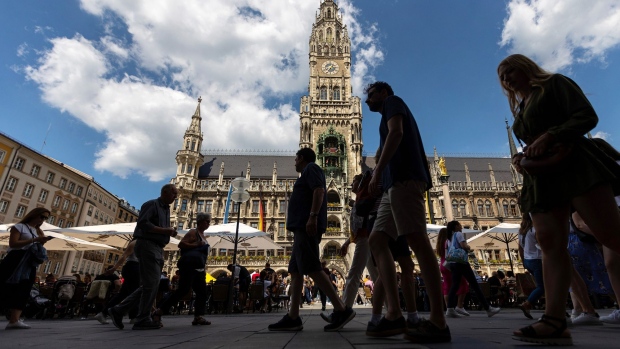Jul 22, 2022
German Economic Activity Unexpectedly Shrinks on Inflation
, Bloomberg News

(Bloomberg) -- Sign up for the New Economy Daily newsletter, follow us @economics and subscribe to our podcast.
Germany’s economy is shrinking for the first time this year as inflation squeezes businesses and households and the war in Ukraine destroys confidence.
A gauge of private-sector activity by S&P Global dropped to the lowest in 25 months in July, falling more than economists had expected and dipping below the threshold that separates expansion from contraction.
Expectations about the future turned negative for the first time since the pandemic began as domestic and foreign demand declined. The figures reinforce predictions that Europe’s biggest economy is heading into a recession in the second half of 2022.
“Having enjoyed a growth boost from the previous easing of virus-related restrictions, a collision of various headwinds in July served to push the German economy into contraction,” said Paul Smith, an economist at S&P Global.
“The decline in output was broad-based, with the downturn in manufacturing deepening, and service-sector activity dropping into contraction territory for the first time since December,” he said.
The euro fell 0.9% against the dollar to $1.0141, the lowest since Tuesday, while German two-year yields, which are among the most sensitive to changes in monetary policy, slumped 18 basis points to 0.50% as money markets pared rate hike wagers.
Germany is among the most-exposed economies to Russia’s invasion of its neighbor due to its outsized reliance on the Kremlin for natural-gas supplies, which have been limited in recent months. Firms in the services industry, meanwhile, are being restrained by labor shortages and customers whose finances are increasingly stretched by inflation.
French activity faced similar issues, though despite activity there also declining more than expected it continued to expand. Still, the data raise concerns that France is also at risk of a recession, S&P Global said.
(Updates with market reaction in sixth paragraph)
©2022 Bloomberg L.P.





